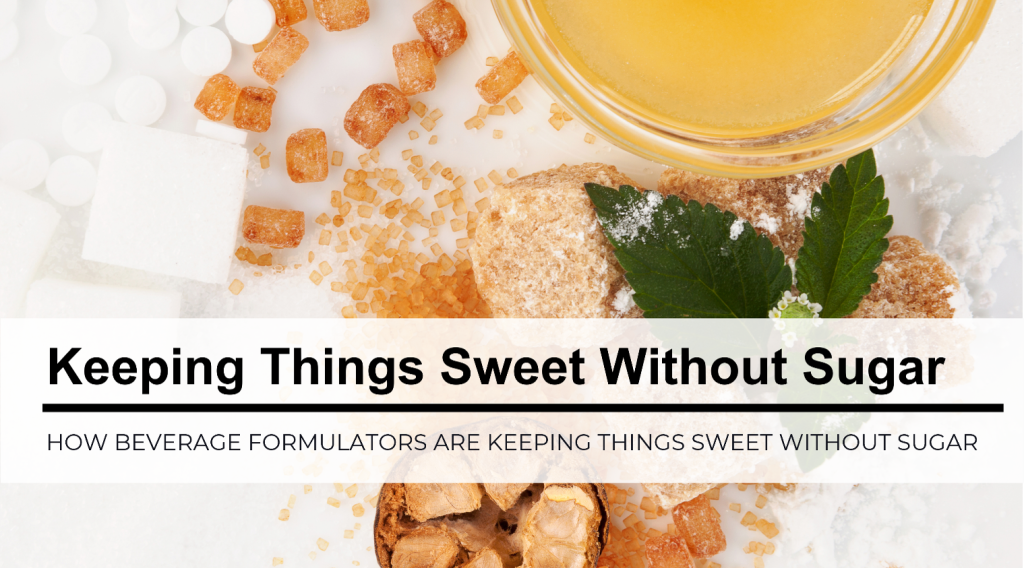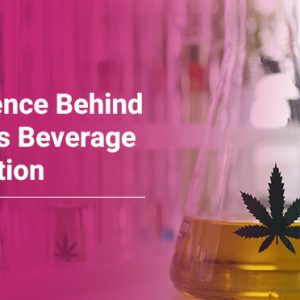Beverage brands, especially those considered functional beverages, are constantly searching for the latest and greatest sweetener – and consumers are drinking it up.
According to SPINS data, within the beverage industry, sales of coconut sugar are up +21.1% from last year, sugar alcohols are up +20.6%, stevia is up +10.3%, and monk fruit is up +1.3%. Several other natural sweeteners are also gaining popularity within beverages, including agave syrup, yacon syrup, allulose and erythritol.
Increased awareness, research, and legislation – even popular diets – are putting pressure on the beverage industry to create products with less sugar or perceived healthier sources of sugar. Creativity and an expanding suite of sweetener options are helping brands answer the growing call for less sugary beverages.
The Growing Stance Against Sugar
Beverages are consistently high on the list of sources of excess sugar that Americans are watching. Studies have tied high sugar intake to several serious health problems, including obesity, type 2 diabetes, cardiovascular disease, and cancer. More research, new regulations, and the rise of popular diets such as Whole30 and Keto, are getting more eyes on the sugar content of beverages.
Changes in labeling have also put the sugar content in packaged goods under increased scrutiny. The FDA’s added sugars declaration now requires food and beverage companies to call out added sugars on their labels in addition to total sugar.
Beverage brands know they can’t ignore the call to cut sugar, but switching out sugar in a beverage formula isn’t just a simple substitution – consumers are not only looking for fewer calories but demanding natural alternatives that still help deliver the great taste consumers expect and demand from their beverages.
Re-Formulating Without Sugar Isn’t Simple
If you’re unfamiliar with sugar’s broad role in a beverage formula, subbing in a sweetener may seem like no big deal. As beverages shift towards clean label formulations and low or no sugars, product formulators are aware, however, that natural sweeteners are not a one-to-one substitute for sugar.
Formulators are constantly trying to emulate sugar’s profile from sweetness onset and linger, to intensity and duration. Many natural alternatives fail to replicate the perception curve of sucrose; for example, they may peak higher or at different times, be more intense or linger longer. Other natural sweeteners have an artificial flavor or unpleasant aftertaste that require additional ingredients such as maskers or modifiers.
Sugar doesn’t just enhance a beverage’s flavor – though matching its qualities in that area is challenging in and of itself. Often, beverage formulators need to use multiple ingredients to make up for sugar’s functionality. In addition to balancing acidic and bitter flavors with sweetness, sugar plays a unique role in texture and mouthfeel, taste, and functionality.
Finding the right sweetener for a specific drink can also be a challenge. For example, monk fruit is a zero-calorie, natural sweetener that is great in coffee beverages but would overwhelm sparkling water’s more delicate flavor profile. Some sweeteners such as sugar alcohol are desirable for keto-friendly beverages because they have zero net carbs; however, these natural alternatives may cause bloating or indigestion in some consumers.
Better Sweeteners
As we learn more about different ingredients and their ability to substitute for sugar, ingredient companies are pushing new extraction and processing methods and bringing entirely new sweeteners into the fold.
One place sweetener advancements are blossoming is within the stevia industry. Stevia sweeteners have been considered GRAS (generally recognized as safe) in the U.S. since 2008. Stevia is about 200 to 300 times sweeter than sucrose (sugar), is naturally derived, and contains negligible calories. The high-intensity sweetener has shown promise in many reduced-sugar products, but it has its challenges. Not everyone likes the taste of stevia — especially the aftertaste that some claim to be too bitter. Stevia also becomes unstable in many solutions.
Stevia-related innovation is emerging with methods for the sustainable production of steviol glycosides, the chemical compounds responsible for the sweet taste of Stevia leaves. Isolating and extracting the different steviol glycosides in the stevia plant allows companies to build better combinations of sweetness profiles and cleaner taste profiles. This ushers in more opportunities to incorporate the sweetener into beverages. At the most recent Natural Products Expo West, Cargill unveiled a stevia solution for concentrate products such as food service fountain drinks, energy shots, alcohol drinks, fruit, dairy, or coffee syrups.
Stevia and monk fruit are both considered natural, high-intensity sweeteners. While Stevia, and to a lesser extent monk fruit, has been driving the natural sweetener category, there are other sweetener alternatives already on, or coming into, the market that formulators can turn to. Many of these are acceptable to consumers as they are “natural” and therefore perceived as healthier; as with stevia, however, there can be challenges associated with their use, including cost, taste and formulation.
Coconut sugar and agave syrup, both natural sugars, are already approaching mainstream awareness. Consumers view them as natural and recognizable and therefore consider them “safer” or “better for you”; however, formulators looking for natural alternatives that permit “sugar free” or “no added sugar” claims would not be able to use these ingredients.
Long-chain carbohydrates such as allulose and inulin act similarly to fiber and therefore pass through the digestive tract before breaking down. While low calorie sweeteners offer the additional advantage of not causing spikes in blood sugar, they can cause digestive distress similar to sugar alcohols such as xylitol.
Plant-based, protein-derived sweeteners sourced from compounds found in exotic fruits such as the katemfe fruit, also offer exciting new options for beverage formulators.
Better Blends
In addition to experimenting with new single-source sweeteners, science, technology, and ambitious beverage formulators are building sweetener blends, where sweeteners can work in synergy to deliver the desired functionality.
Sweetener blends come with several advantages. When blended, they can deliver a range of enhancements ranging from better flavor and improved solubility to faster dissolution and increased stability.
Advances in sweetener blends are helping beverage formulators replace sugar while still meeting consumers’ expectations for taste. One popular sweetener blend combines the sugar alcohol erythritol with stevia. Erythritol is only 70% as sweet as sugar, but it fixes several stevia problems by intensifying the mouthfeel, acting as a bulking agent, reducing off-tastes, and balancing the sweetness.
Set Your Beverage Up for Success
The most crucial role of any sweetener is to deliver the great taste and quality consumers expect and demand from their beverages.
Consumer demand for low or no sugar and more natural sweeteners shows no sign of slowing. However, consumers are unwilling to sacrifice their expectations for sweetness, mouthfeel, and taste that have been set by sugar. Fortunately, the menu of natural sweeteners and sweetener blends is expanding to meet the deepening understanding of their role and potential in beverages. It’s an exciting space that is constantly changing!
There’s never been a better time to explore sweetener options for your beverage. Give us a call to discuss a sweetener strategy to set your next drink up for success.


